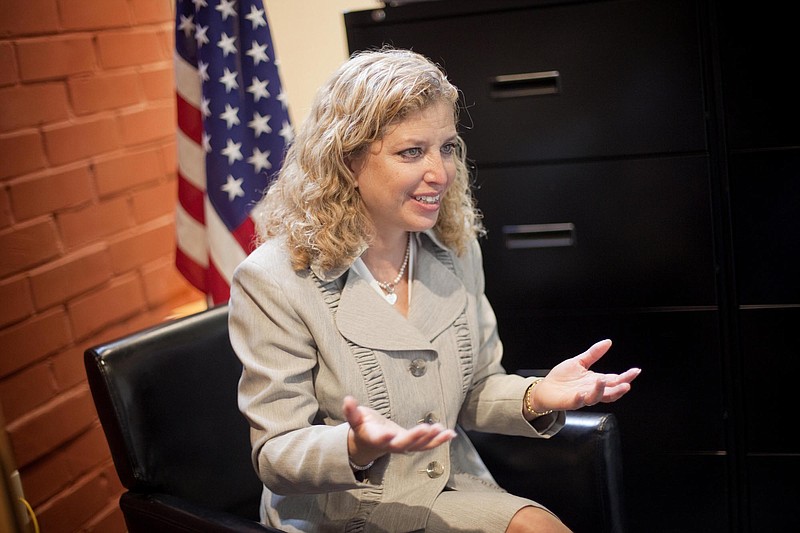That was the FBI at the door?
U.S. Rep. Debbie Wasserman Schultz, D-Fla., didn't get a fond farewell when she left as head of the Democratic National Committee (DNC) last summer. Now she is virtually calling former Obama administration Secretary of Homeland Security Jeh Johnson and former DNC vice chairwoman Donna Brazile liars for saying federal officials contacted the party about the Russian hacking of their internet servers last year.
"He's wrong in every respect," she said of Johnson. "At no point during my tenure at the DNC was I contacted by the FBI, DHS, or any government agency or alerted or made aware that they believed that the Russians [were] intruding on our network."
Johnson, testifying under oath, told the House Intelligence Committee last week the DNC refused Homeland Security's help with the hacking and would not turn over their hacked servers.
"Respectfully, Secretary Johnson is utterly misinformed," Wasserman Schultz said on CNN. "The FBI and other federal agencies did virtually nothing to sound the alarm bells."
Brazile told CNN last summer the party did not "ignore the warning from the FBI or other federal officials" and, in fact, upon notification "changed systems, changed procedures."
No post-loss bounce
Most presidential losers in recent years, according to Gallup polling, have increased their favorability ratings after their defeats. Hillary Clinton, the polling company says, is an exception.
"With the exception of John Kerry, for whom there are no comparable data, losing presidential candidates since 1992 have experienced a boost of at least four percentage points in favorability when averaging their ratings from the day after the election through the following June," Gallup noted.
But Clinton is viewed favorably by only 41 percent of Americans, which is within the 41-43 percent range she has been in since her loss to Donald Trump in November.
America, apparently, wasn't ready for Hillary, who has been viewed unfavorably in Gallup polling since January 2016 and today is viewed unfavorably by 57 percent of Americans.
In attempting to explain her lack of favorability, the polling organization said Clinton was better liked when she was less political, such when she was first lady, suffered through her husband's scandals or was secretary of state.
It also mentioned that some of her post-election appearances have been less than well received since she has "blamed her election loss on various factors" while claiming to "'take responsibility for every decision' her campaign made."
Radically clueless
Colleges fortunately still produce their share of independent thinkers, but we're afraid that number is rapidly declining. Unfortunately, parroting what liberal professors and left-wing media tell them passes for what they possess in current events knowledge.
Cabot Phillips of Campus Reform recently checked out how the term "radical Islam" played among higher education students.
The country should be "focusing more on an acceptance and a rehabilitation of extremist groups," one young man said, "kind of figuring out why they're extremist."
There's a "very strong, deep-seated fear [of radical Islam] in the United States that's often, in my opinion," one young woman said, "irrational."
One young man took another tack, comparing radical Islam to domestic Christian terrorism.
"There's been domestic terrorism with Christian groups, for example," he said, "and you don't call them you don't go around saying 'radical Christianism' or 'radical capitalist' or things like that."
"Which attacks would those be?" Phillips asked.
"I can't name them from the top of my head," he said haltingly, "but I know that they're, like, in churches. Actually, I can't name any off the top of my head."
Cue the crickets.
Kumbaya out, division in
Not so long ago, the concept of "color blindness," as it was concerned with what frame of mind one should view society, or "meritocracy," as in holding power based on ability, were thought to be positive concepts.
Not anymore, at least not at Rowan University in Glassboro, N.J.
The school recently published a guide on "Interrupting Microaggressions," which suggests "calling out" those who use the aforementioned terms.
The guide lists examples of "microaggressions," provides suggestions for "Third Party Intervention" approaches and explains things further in "Communication Approach."
"Everyone can succeed in this country, if they work hard enough" is another microaggression, which the guide suggests should be challenged. The same goes for "I don't believe in race" and "When I look at you, I don't see color."
Instead, the guide suggests, people need to be separated into various divisions, classes, races, etc.
"As a Prof," it says to teachers, "you have an obligation to take an active role in fostering an appreciation for diversity and sending the message loud and clear that bias-related acts will not be tolerated."
Since Rowan is a public university, the taxpayer dollars of New Jersey citizens are funding this poison.
